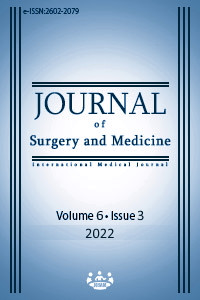Can YouTube videos concerning the esophagogastroduodenoscopy experience be a reliable and satisfactory source of information for patient education in developing countries? A cross-sectional study from Turkey
Keywords:
Patient education, YouTube, Esophagogastroduodenoscopy, Upper gastrointestinal endoscopy, Social media, Medical informationAbstract
Background/Aim: Social media has great potential for easy access to medical information especially in underdeveloped countries. We aimed to analyze the content, reliability and quality of the most viewed YouTube videos, targeting patients intending to use this social media platform as a source of information about the esophagogastroduodenoscopy (EGD) procedure. Methods: Using the keywords “esophagogastroduodenoscopy” and “upper gastrointestinal endoscopy”, we assessed the publicly visible English-language videos available on YouTube. EGD Data Quality Score (EGD-DQS), Global Quality Score (GQS) and a modified DISCERN scale were used to assess the quality, flow and ease of use of the information and the reliability of the EGD videos. Results: Universities/health-care professional group was the most common source of video upload (36%). The reliability score of the videos presented by physicians was significantly higher compared to all other lecturer groups (P=0.044). The reliability score, EGD-DQS and GQS score were also found to be statistically higher in the universities/health-care professional group compared to the health information websites, advertisement and patient groups (P<0.05, for all). Useful information was significantly higher in the universities/health-care professional group compared to the remaining upload sources (P<0.05). Lastly, patient-uploaded videos received more "likes" and "comments", and a higher number of subscribers. Conclusions: YouTube is a powerful source of information for EGD procedure, especially where patients suffer to reach health care information due to inadvertent health policies. Academic sources should create videos that attract the interest of the viewers, and physicians should direct patients to online resources that present accurate and reliable information.
Downloads
References
ASGE Standards of Practice Committee; Dayna S Early, Tamir Ben-Menachem, G Anton Decker, et al. Appropriate use of GI endoscopy. Gastrointest Endosc, Practice Guideline. 2012;75:1127-31.
Peery AF, Crockett SD, Murphy CC, et al. Burden and Cost of Gastrointestinal, Liver, and Pancreatic Diseases in the United States: Update 2018. Gastroenterology. 2019;156:254-72.
Mahajan RJ, Johnson JC, Marshall JB. Predictors of patient cooperation during gastrointestinal endoscopy. J Clin Gastroenterol. 1997;24:220-3.
Hesse BW, Nelson DE, Kreps GL, et al. Trust and sources of health information: the impact of the Internet and its implications for health care providers: findings from the first Health Information National Trends Survey. Arch Intern Med. 2005;165:2618-24.
Madathil KC, Rivera-Rodriguez AJ, Greenstein JS, et al. Healthcare information on YouTube: a systematic review. Health Informatics J. 2015;21:173-94.
Brachtenbach T, Cardenas R, Pate H, et al. YouTube: searching for answers about breast cancer. Breast Dis. 2020;39:85-90.
Kumar N, Pandey A, Venkatraman A, et al. Are video sharing web sites a useful source of information on hypertension? J Am Soc Hypertens. 2014;8:481-90.
Leong AY, Sanghera R, Jhajj J, et al. Is YouTube useful as a source of health information for adults with type 2 diabetes? A South Asian perspective. Can J Diabetes. 2018;42:395-403.
Tolu S, Yurdakul OV, Basaran B, et al. English-language videos on YouTube as a source of information on self-administer subcutaneous anti-tumour necrosis factor agent injections. Rheumatol Int. 2018;38:1285-92.
Garg N, Venkatraman A, Pandey A, et al. YouTube as a source of information on dialysis: A content analysis. Nephrology (Carlton). 2015;20:315-20.
Basim P, Argun D. A Qualitative Analysis of Ostomy-Related Patient Education Videos on YouTube. Adv Skin Wound Care. 2021;34:314-20.
Rittberg R, Dissanayake T, Katz SJ. A qualitative analysis of methotrexate self-injection education videos on YouTube. Clin Rheumatol. 2016;35:1329-33.
Radadiya D, Gonzalez-Estrada A, Lira-Vera JE, et al. Colonoscopy videos on YouTube: Are they a good source of patient education? Endosc Int Open. 2020;8:598-606.
Basch CH, Hillyer GC, Reeves R, Basch CE. Analysis of YouTube™ videos related to bowel preparation for colonoscopy. World J Gastrointest Endos. 2014;6:432-5.
Ajumobi AB, Malakouti M, Bullen A, Ahaneku H, Lunsford TN. YouTube™ as a source of instructional videos on bowel preparation: a content analysis. J Canc Educ. 2016;31:755-9.
Esen E, Aslan M, Sonbahar BC, Kerimoglu RS. YouTube English videos as a source of information on breast self-examination. Breast Cancer Res Treat. 2019;173:629-35.
American Society of Gastrointestinal Endoscopy, Patient Education: Upper Endoscopy (2020) https://www.youtube.com/watch?v=UODNK2DfwfY.
Bernard A, Langille M, Hughes S, et al. A systematic review of patient inflammatory bowel disease information resources on the World Wide Web. Am J Gastroenterol. 2007;102:2070-7.
Singh AG, Singh S, Singh PP. You Tube information on rheumatoid arthritis- a wakeup call? J Rheumatol. 2012;39:899-903.
Hesse BW, Moser RP, Rutten LJ. Surveys of physicians and electronic health information. N Engl J Med. 2010;362:859-60.
Yang SJ, Chee YK, An J, et al. Analysis of validity and reliability of the Health Literacy Index for Female Marriage Immigrants (HLI-FMI). Asia Pac J Public Health. 2016;28:368-81.
Rizk MK, Sawhney MS, Cohen J, et al. Quality indicators common to all GI endoscopic procedures. Am J Gastroenterol. 2015;110:48-59.
Behrouzian F, Sadrizadeh N, Nematpour S, et al. The Effect of Psychological Preparation on the Level of Anxiety before Upper Gastrointestinal Endoscopy. J Clin Diagn Res. 2017;11:1-4.
Faigel DO, Eisen GM, Baron TH, et al. Standards of Practice Committee. American Society for Gastrointestinal Endoscopy, Preparation of patients for GI endoscopy. Gastrointest Endosc. 2003;57:446-50.
Tanrıöver MD, Yıldırım HH, Ready ND, Çakır B, Akalın E. Turkey Health Literacy Research. Health-Syn Publications December, Ankara. 2014.
Yilmazel G, Cetinkaya F. Health literacy among schoolteachers in Çorum, Turkey East Mediterr Health J. 2015;28:598-605.
Downloads
- 357 485
Published
Issue
Section
How to Cite
License
Copyright (c) 2022 Derya Argun, Pelin Basim
This work is licensed under a Creative Commons Attribution-NonCommercial-NoDerivatives 4.0 International License.
















